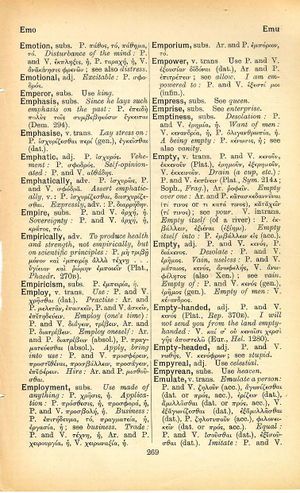emphasis: Difference between revisions
From LSJ
τὸ ἀγαθὸν αἱρετόν· τὸ δ' αἱρετὸν ἀρεστόν· τὸ δ' ἀρεστὸν ἐπαινετόν· τὸ δ' ἐπαινετὸν καλόν → what is good is chosen, what is chosen is approved, what is approved is admired, what is admired is beautiful
(6_6) |
m (Text replacement - "]]>" to "]]") |
||
| Line 4: | Line 4: | ||
}} | }} | ||
{{Lewis | {{Lewis | ||
|lshtext=<b>emphăsis</b>: is, f., = [[ἔμφασις]] | |lshtext=<b>emphăsis</b>: is, f., = [[ἔμφασις]], a [[figure]] of rhet.,<br /><b>I</b> [[emphasis]], [[rhetorical]] [[stress]] (cf.: [[pondus]], [[significatio]]), Quint. 9, 2, 64; 8, 2, 11; 8, 3, 86 al. | ||
}} | }} | ||
Revision as of 09:32, 13 August 2017
English > Greek (Woodhouse)
subs.
Since he lays such emphasis on the past: P. ἐπειδὴ πολὺς τοῖς συμβεβηκόσιν ἔγκειται (Dem. 294).
Latin > English (Lewis & Short)
emphăsis: is, f., = ἔμφασις, a figure of rhet.,
I emphasis, rhetorical stress (cf.: pondus, significatio), Quint. 9, 2, 64; 8, 2, 11; 8, 3, 86 al.

